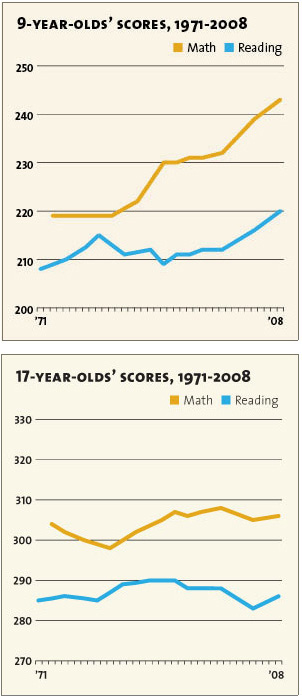SAT scores have been dropping slowly but steadily for the past decade:
The steady decline in SAT scores and generally stagnant results from high schools on federal tests and other measures reflect a troubling shortcoming of education-reform efforts. The test results show that gains in reading and math in elementary grades haven’t led to broad improvement in high schools, experts say. That means several hundred thousand teenagers, especially those who grew up poor, are leaving school every year unready for college.
“Why is education reform hitting a wall in high school?” asked Michael J. Petrilli, president of the Thomas B. Fordham Institute, a think tank. “You see this in all kinds of evidence. Kids don’t make a whole lot of gains once they’re in high school. It certainly should raise an alarm.”
It is difficult to pinpoint a reason for the decline in SAT scores, but educators cite a host of enduring challenges in the quest to lift high school achievement. Among them are poverty, language barriers, low levels of parental education and social ills that plague many urban neighborhoods.
 I’m delighted to see an education story that acknowledges the plain evidence of test score gains, even if just in an aside. The simple fact is that through middle school, standardized test scores have risen significantly over both the past decade and the past four decades. Elementary and middle school test scores have not been either stagnant or dropping, but based on the usual reporting of this stuff, I doubt that one person in a hundred is aware of this.
I’m delighted to see an education story that acknowledges the plain evidence of test score gains, even if just in an aside. The simple fact is that through middle school, standardized test scores have risen significantly over both the past decade and the past four decades. Elementary and middle school test scores have not been either stagnant or dropping, but based on the usual reporting of this stuff, I doubt that one person in a hundred is aware of this.
But I’m also happy to see the flip side of this acknowledged: in general, all these gains wash away in high school. On the “gold standard” NAEP test, math scores have gone up just a few points among 17 year olds and reading scores have been flat. The usual explanation is that education reforms have initially been centered on elementary and middle schools, and scores will go up for older kids once those reforms start to become widespread in high schools.
Maybe. But that excuse is starting to look old in the tooth. And even if high schools haven’t seen a lot of reforms yet, why is it that they seem to have a negative effect on student performance? If math scores were up, say, ten points by the end of middle school and remained ten points up by the end of high school, that would be one thing. High schools wouldn’t be adding anything, but they wouldn’t be doing any harm either. But that’s not the case. Kids come out of middle school better prepared today, but come out of high school no better than they did in 1971. High school is actually erasing gains.
This is, needless to say, troubling. Poverty, language barriers, low levels of parental education and social ills are problems at all ages, so that explains little. Nor does disaggregating scores by race, since demographic changes have been similar at all age levels. But the plain truth is that the only thing that really matters is how well prepared kids are when they finish high school. All the test score gains in the world mean nothing if they’re gone by age 17. This is something we really need to figure out.














